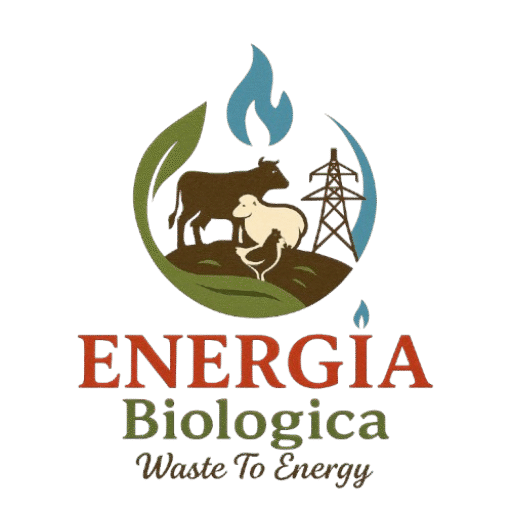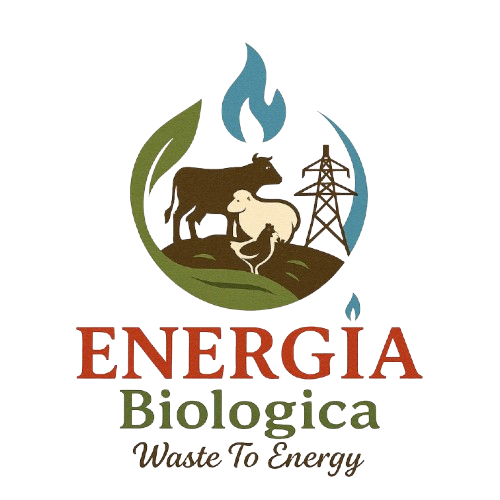Nigeria, a nation brimming with dynamism and potential, faces a dual challenge: persistent energy deficits and escalating waste management issues. In countless communities, access to reliable, affordable, and clean energy remains a significant hurdle, while mountains of organic waste accumulate, posing environmental and health risks. Yet, within this challenge lies a remarkable opportunity: the transformative potential of anaerobic digestion, a natural biological process that converts organic waste into valuable biogas and nutrient-rich biofertilizer. This article delves into the science of anaerobic digestion and illuminates how this sustainable technology can unlock a new era of energy security, waste valorisation, and economic development for Nigeria.
At the forefront of catalysing this sustainable biogas development in Nigeria is Energia Biologica Limited. As a pioneering biogas industry facilitator, Energia Biologica embraces a partnership-driven, integrative approach, bringing together essential components—finance, technology, construction, and operations partners—to realize impactful biogas initiatives. Our mission is to position biogas as a cornerstone of Nigeria’s energy future, transforming what was once considered waste into a tangible source of wealth and progress.
Understanding Anaerobic Digestion: Nature’s Waste-to-Energy Engine
Anaerobic digestion (AD) is a series of biological processes where microorganisms break down biodegradable material in the absence of oxygen. Imagine a giant, sealed stomach where microscopic organisms feast on organic matter, producing a potent, combustible gas as a byproduct. This gas, known as biogas, is primarily composed of methane (CH4) and carbon dioxide (CO2).
The process typically unfolds in four main stages:
- Hydrolysis: Complex organic polymers like carbohydrates, proteins, and fats are broken down into simpler molecules such as sugars, amino acids, and fatty acids by hydrolytic bacteria.
- Acidogenesis: Acid-forming bacteria convert these simpler molecules into various organic acids, along with carbon dioxide and hydrogen.
- Acetogenesis: Acetogenic bacteria further transform these organic acids into acetic acid, hydrogen, and carbon dioxide.
- Methanogenesis: The crucial final stage where methanogenic archaea consume the acetic acid, hydrogen, and carbon dioxide to produce methane and more carbon dioxide, forming the biogas.
These processes occur within an enclosed vessel called an anaerobic digester or biodigester, which can vary in size from small, household units to large-scale industrial plants. The controlled environment of the digester allows for the efficient capture and utilization of the produced biogas, preventing the release of harmful methane into the atmosphere that would otherwise occur from uncontrolled decomposition in landfills or waste dumps. This makes anaerobic digestion a powerful tool for climate action and improved air quality.
Nigeria’s Abundant Feedstock: Fuelling the Biogas Revolution
Nigeria is blessed with an immense and largely untapped resource: organic waste. The sheer volume of agricultural residues, livestock waste, and municipal organic waste generated daily presents a staggering opportunity for waste management in Nigeria and clean energy production.
Consider these key feedstock sources:
- Livestock Manure: With a vast livestock population across states like Kano, Kaduna, Oyo, and many others, cattle markets and abattoirs generate enormous quantities of manure. This includes cow dung, poultry droppings, and piggery waste, all highly suitable for anaerobic digestion. For instance, large cattle markets in places like Kara in Sokoto or Agege in Lagos produce tons of manure daily, currently posing significant disposal challenges.
- Abattoir Waste: Beyond manure, abattoirs produce a range of organic waste, including blood, paunch contents, and condemned carcasses. These high-protein and high-fat materials can significantly boost biogas yields when co-digested with other feedstocks. Effective utilization of abattoir waste through AD not only generates energy but also addresses public health and environmental sanitation concerns.
- Agricultural Residues: From the vast agricultural zones stretching across Nigeria, tons of crop residues are left on farms after harvest. This includes rice husks, maize stalks, cassava peels, palm oil mill effluent (POME), and sugarcane bagasse. These residues, often burned or left to decompose, contribute to air pollution and nutrient loss. Anaerobic digestion offers a sustainable pathway to convert them into valuable energy and fertilizer.
- Municipal Organic Waste: Nigerian cities, with their rapidly growing populations, generate substantial amounts of organic household and market waste, estimated to be the largest fraction of municipal solid waste. Diverting this waste from overflowing landfills through AD can drastically improve urban sanitation and create localized energy sources.
Energia Biologica’s integrated approach to biogas development focuses on identifying and optimizing these diverse feedstock streams. Our expertise allows us to design and implement systems that effectively process a mix of organic wastes, maximizing biogas yield and ensuring the long-term viability of projects.
Outputs of Anaerobic Digestion: A Trifecta of Benefits
The beauty of anaerobic digestion lies not just in its ability to manage waste, but in the valuable resources it creates. The process yields a powerful trifecta of outputs that hold immense potential for Nigeria’s development:
- Clean Electricity: Biogas can be directly combusted in combined heat and power (CHP) generators to produce electricity and heat. This decentralized power generation capability is particularly critical for bridging Nigeria’s energy access gap, especially in rural and off-grid communities. Imagine communities powered by their own waste, gaining energy independence Nigeria.
- Biomethane: Through a purification process called upgrading, biogas can be refined into biomethane, which is virtually identical to natural gas. This renewable gas can be injected into existing gas grids, used as a clean transportation fuel, or compressed for direct use in homes and industries. This opens possibilities for clean cooking fuels, reducing reliance on firewood and charcoal, which contribute to deforestation and indoor air pollution.
- Organic Fertilizer (Digestate): The solid and liquid residues remaining after digestion, collectively known as digestate, are rich in essential plant nutrients like nitrogen, phosphorus, and potassium. Unlike raw manure, digestate is a stable, odour-reduced, and pathogen-reduced organic fertilizer. Its application improves soil health, reduces the need for synthetic chemical fertilizers, and enhances agricultural productivity. This closes the loop in a truly circular economy, returning valuable nutrients to the soil.
A Practical Example: Driving Impact Through Integrated Solutions
While the concept of anaerobic digestion may seem technical, its practical applications are already transforming communities. Consider the potential for an integrated industrial park development biogas Nigeria, where multiple industries and agricultural operations can collectively contribute their organic waste to a centralized biogas plant, benefiting from shared infrastructure and a reliable, locally generated energy source.
Take, for instance, a hypothetical mini-grid project in a Nigerian community like the model set by the Rije mini-grid in other contexts. In such a scenario, an Energia Biologica-facilitated project could establish a biogas plant fuelled by local livestock manure and agricultural waste. This plant would generate electricity to power homes, small businesses, and community facilities, alleviating the burden of unreliable grid supply and expensive diesel generators. The digestate produced would then be distributed to local farmers, boosting crop yields and fostering sustainable agriculture. This integrated approach not only provides clean energy but also supports livelihoods and strengthens the local economy.
Driving Sustainability and Economic Growth
The widespread adoption of biogas technology in Nigeria directly aligns with several United Nations Sustainable Development Goals (UN SDGs):
- SDG 7: Affordable and Clean Energy: By providing access to decentralized, renewable energy, biogas projects directly address the goal of ensuring access to affordable, reliable, sustainable, and modern energy for all.
- SDG 12: Responsible Consumption and Production: Biogas promotes sustainable waste management practices by transforming organic waste into valuable resources, thereby moving towards a circular economy model.
- SDG 13: Climate Action: Capturing methane from organic waste prevents its release into the atmosphere, a potent greenhouse gas, thus mitigating climate change. Furthermore, replacing fossil fuels with biogas reduces carbon emissions.
Nigeria’s vast organic waste resources present an unparalleled opportunity. It is estimated that harnessing this potential could generate millions of MWh of clean energy and thousands of tons of biofertilizer annually, significantly contributing to national energy security and agricultural productivity.
However, realizing this potential requires a strategic, collaborative effort. Energia Biologica’s role as a strategic integrator is precisely to bridge the gaps between promising technology, necessary financing, expert construction, and efficient operations. We believe in a partnership-driven approach, fostering collaboration among all stakeholders – from local farmers and communities to investors and government bodies – to unlock the full potential of renewable energy Nigeria.
Join the Biogas Revolution with Energia Biologica
The journey towards a cleaner, more energy-secure, and economically vibrant Nigeria is a shared one. The science of anaerobic digestion offers a proven pathway, and with Nigeria’s abundant resources, the time for a biogas revolution is now.
Explore partnership opportunities with Energia Biologica to develop bankable biogas projects across Nigeria’s high-potential locations.
By embracing this waste-to-wealth transformation, we can collectively build a sustainable future for Nigeria, powered by its own untapped resources.

